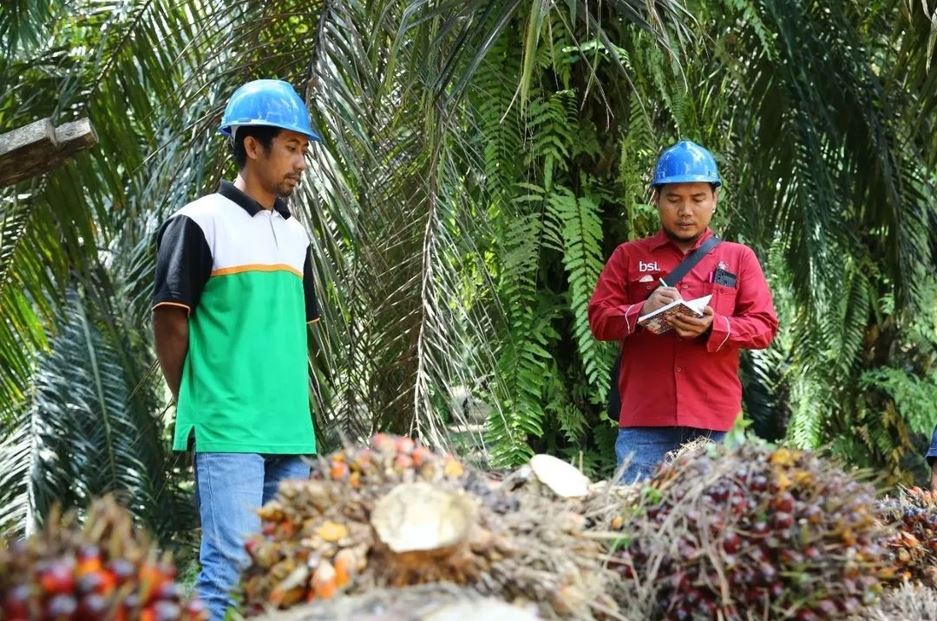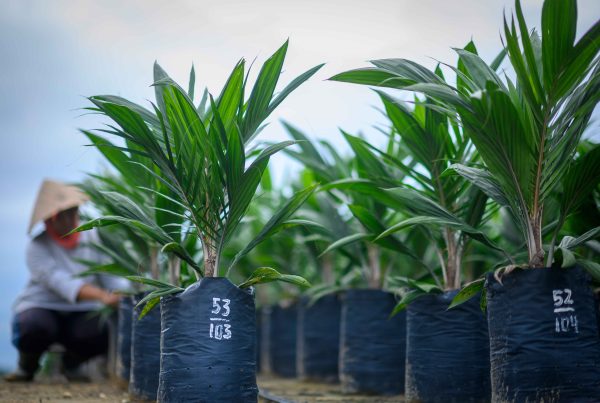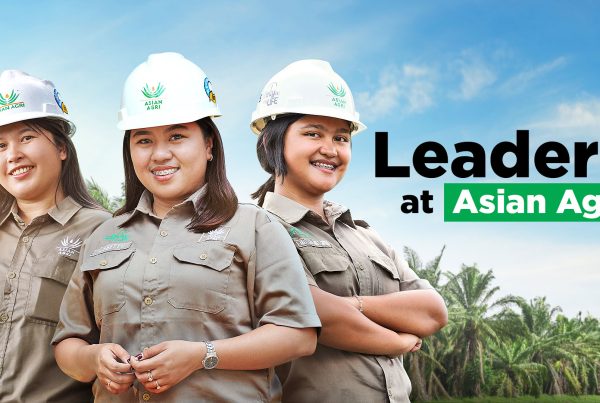
In this photo, an independent smallholder from Putra Tunggal Bukit Sangkilan Association in Bulian Jaya Village, Jambi province, was undertaking a 4-day audit process to secure RSPO certification
As the global leader in crude palm oil (CPO) production and exports, Indonesia recognizes the indispensable role of smallholders in the palm oil industry supply chain. Smallholders not only contribute significantly to the country’s economy but also play a vital role in sustaining the palm oil sector.
Data from the Indonesian Palm Oil Statistics 2022, provided by the Central Statistics Agency (BPS), reveals that out of the approximately 16.83 million hectares of total oil palm plantations in Indonesia, 6.21 million hectares or 40.51% are owned by smallholders. Private plantations cover 8.58 million hectares (55.92%), while the remaining 0.55 million hectares (3.57%) are under large state-owned plantations.
Smallholder oil palm plantations, managed by local communities, often involve the sale of a significant portion of their produce on a limited scale. Many of these plantations lack legal registration, with land often passed down through generations.
The managers of smallholder oil palm plantations fall into two categories: scheme smallholders, who have contractual ties or credit agreements with palm oil mills, and independent smallholders, lacking such connections in selling their fresh fruit bunches.
According to the Plantation Statistics Book 2021-2022, around 2.5 million smallholder are engaged in oil palm cultivation in Indonesia, comprising both scheme and independent smallholders.[1] Airlangga Hartarto, the Coordinating Minister for Economic Affairs, acknowledges that despite their substantial land contributions, smallholder plantations yield less compared to those of private companies and state-owned enterprises.
“Support is needed, especially in facing climate change issues. Smallholders face several challenges, especially in terms of productivity and capacity,” said Airlangga, who is also the Chair of the Steering Committee of the Indonesian Oil Palm Plantation Fund Management Agency (BPDPKS), during the 2021 National Research Week.
Despite being a source of income for generations, these smallholders face limitations in capital, experience in plantation management, and the ability to handle land ownership legality, hindering their path to prosperity. Plantations managed by independent smallholders also tend to be less productive compared to scheme smallholder plantations.
Environmental concerns, including accusations of contributing to deforestation, land ownership conflicts, and low prices for FFB, present ongoing challenges for these smallholders. While palm oil is a vital commodity for various products globally, consumers are increasingly demanding sustainable farming practices to mitigate negative environmental impacts.
Investing in Human Resources
Major palm oil companies, such as Asian Agri, have long been committed to addressing these challenges. Empowering smallholders has been a cornerstone of Asian Agri’s operations since its inception over 40 years ago, viewing them as essential partners in the industry’s supply chain and Indonesia’s economy. The company partnered with more than 300,000 smallholders covering more than 100,000 hectares of plantation. Currently, Asian Agri manages 30 plantations, 22 palm oil mills, 1 kernel crushing plants, and 11 Biogas plants.
In 2022, Asian Agri launched the Asian Agri 2030 initiative, dedicated to ensuring sustainable oil palm cultivation through partnerships, suppliers, and employee engagement. The initiative aims to protect the environment, forests, ecosystems, wildlife, and communities, including the welfare of smallholders who, by 2030, are projected to account for 60% of Indonesia’s palm oil production.[2]
Asian Agri, acknowledging the challenges hindering the smallholders from adopting sustainable practices, emphasizes the importance of a balanced and holistic approach in social and environmental aspects for business success.
Key challenges include land ownership regulations, bureaucratic obstacles creating legal uncertainty, and limited access to resources and financing, impeding the adoption of sustainable practices. Asian Agri actively supports its smallholders in obtaining certifications, addressing documentation costs, audits, and workforce training.
“We are aware that slow and transformational changes are needed in our operations to achieve our goal of improving lives through sustainable resource management,” said Kelvin Tio, Managing Director of Asian Agri, as quoted in the 2022 Sustainability Report.
A Legacy of Partnership with Smallholders
Since its inception in North Sumatra back in 1979, the Asian Agri Group has been dedicated to empowering and collaborating with smallholders. Serving as a pioneer in this endeavor, engaging with both independent and plasma smallholders, Asian Agri has fostered strong relationships for over 35 years.
“Working with smallholders is one of Asian Agri’s lifelines, given approximately 60% of our CPO production is supplied by smallholders. These partnerships form the bedrock of our business model, rendering smallholders indispensable,” states the Asian Agri 2022 Sustainability Report.
The commitment extends beyond words, as Asian Agri actively works with smallholders to enhance cooperation and provide various forms of assistance. This close partnership is more than a mere commitment; it materializes in concrete actions aimed at improving livelihoods and recognizing the importance of decent living standards for smallholders.
Taking a holistic approach, Asian Agri 2030 (AA2030) elevates environmental and social considerations alongside business success. Within the Smallholder Partnership pillar of AA2030, Asian Agri reinforces replanting programs for smallholders, targeting a doubling of their income by 2030.
To achieve this, the company is replanting to address declining productivity due to aging oil palm trees and resolving technical challenges in harvesting oil palm, aiming to increase income from the sale of fresh fruit bunches. This aligns with Asian Agri’s long-term commitment to supporting smallholders, emphasizing economic, social, and environmental impact.
In addition to replanting efforts, Asian Agri has been actively assisting smallholders in obtaining certifications since 2012. Independent and plasma smallholders can be guided to obtain the Indonesian Sustainable Palm Oil (ISPO) certification, and independent smallholders for the Roundtable on Sustainable Palm Oil (RSPO).
The company partners with scheme smallholders by providing them with access to financing, technical support, training and guidance for effective, sustainable, and efficient palm oil harvesting and management. Asian Agri has also assisted them in obtaining RSPO and ISCC certifications. Currently, we are working with them to obtain the ISPO certificates.
Committed to smallholder success, the company reinvests a portion of its sustainable palm oil profits into support programs. 2022 initiatives focused on enhancing agronomic skills, promoting livestock cultivation, and improving village and plantation infrastructure.
These programs have significantly boosted smallholder incomes. In 2022, Riau smallholders earned approximately 2.7 times the provincial minimum wage, while those in Jambi earned around 2.5 times their regional minimum. Incomes also rose significantly compared to 2021, with increases of 12.8% (Riau) and 6.3% (Jambi).
SMILE & CSF Programmes
The collaboration between Asian Agri and RSPO has rapidly developed since the company joined in 2006. In October 2020, Asian Agri partnered with Apical and Kao Corporation, a Japanese global chemical and cosmetic company, to launch the SMallholder Inclusion for Better Livelihood & Empowerment (SMILE) programme. This initiative aims to assist independent smallholders in overcoming significant challenges to increase palm oil production while meeting strict sustainability criteria, showcasing notable progress since its launch.
SMILE’s positive impact was recently unveiled at the Roundtable on Sustainable Palm Oil (RSPO) 2023 Conference in Jakarta, where it helped 628 independent smallholders achieve the coveted RSPO Certificate. The program plays a crucial role in providing training and assistance to independent smallholders, empowering them to adopt sustainable practices. RSPO actively supports and promotes SMILE collaboration among stakeholders in the palm oil supply chain to strengthen the capacity of independent smallholders in Indonesia.
In addition to SMILE, Asian Agri has been assisting independent smallholders through Corporate Shared Value (CSV) since 2012. The company’s support spans 8,525 independent smallholders across North Sumatra, Riau, and Jambi, managing a total of 39,116 hectares of land in 2022.
This program, developed based on the success and learning from the scheme smallholders program, aims to provide resources to support independent smallholders, including helping them form cooperatives. The CSV program offers training on palm oil production and Best Management Practices, improves access to quality seeds, equipment, and financing resources for replanting, and supports independent smallholders in obtaining sustainability certifications.
In 2022, Asian Agri supported nearly 700 smallholders in obtaining RSPO certification through the RSPO Independent Smallholder Standard (RISS) certification scheme. Aligned with the development trajectory of AA2030, 390 independent smallholders successfully secured RSPO certification.
Looking ahead, Kelvin Tio, as quoted from the 2022 Sustainability Report, expresses Asian Agri’s commitment to enhancing measures that integrate sustainability into their business and operational strategies. The company’s vision revolves around creating value for Community, Country, Climate, Customers, and Company, acknowledging existing challenges with confidence in turning them into opportunities for sustainable business development.
“We recognize that there will be challenges to overcome as we continue to realise our AA2030 targets and commitments, but we are confident in translating them into opportunities to grow our business sustainably,” he said.
[1] https://ditjenbun.pertanian.go.id/?publikasi=buku-statistik-perkebunan-2021-2023
[2] Industri Kelapa Sawit Nasional Perkuat Kemitraan Petani Sawit untuk Masa Depan Sawit Indonesia yang Berkelanjutan – Kementerian Koordinator Bidang Perekonomian Republik Indonesia



